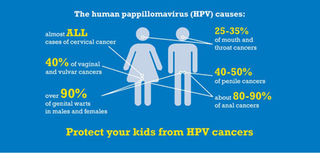A virus responsible for many cancer cases

Illustration showing how HPV is responsible for causing various types of cancer and to what extent. INGOGRAPHIC | CANADIAN CANCER SOCIETY
There are growing concerns about the Human Papilloma Virus (HPV), a sexually transmitted virus threatening Tanzanian women.
The disease, which is still unknown to many Tanzanians, has become the most common sexually transmitted virus, putting many women at high risk of developing cervical cancer.
According to Dr Nestory Masalu, an Oncologist at Bugando Medical Center (BMC), the virus has no cure yet and is spread through vaginal, oral and anal sex.
Without giving figures on patients admitted with HPV complications at the facility, he said the virus has become so common that nearly all sexually active women get it at some point in their lives.
“The HIV agenda has been pushed so much that we may have forgotten about other equally deadly sexually-transmitted viruses such as HPV,” says Dr Masalu.
On her part, Nyamagana district hospital’s doctor in charge, Agnes Mwita explained that HPV also causes non-cancerous, nipple-like bumps called warts on the skin in the genital area or in other parts of the body as well as ulcerations.
She said the ulcerations may make women more vulnerable to other sexual transmitted diseases (STI’s) such as HIV.
“Unlike other STIs, HPV infection causes havoc silently. It does not produce any symptoms until at advanced stages when it has caused cervical cancer. Men often carry the virus, and transmit it to women during sex. In men, the infection is linked to penile, anal and throat cancers, though cases are still rare in Tanzania,” said Dr Mwita.
An alien virus
Despite the huge dangers posed by HPV, an overwhelming majority of Tanzanians remain unaware of the virus and how to protect themselves.
Dr Mwita, however, said that due to exposure to early sexual intercourses on youth, the pace has on HPV infections has multiplied especially on young ladies.
“A patient with HPV virus will automatically have a very low immunity and thus the mechanism to fight against other diseases will be very weak,” she informed.
One of the health experts in Mwanza regional hospital, who claimed for anonymity, said the facility admits about five to ten patients with HPV cases daily.
He added that it has become more challenging to discover the virus because of its symptoms which are related to other sexual transmitted diseases. This is more serious in rural parts.
“HPV, I can say is a new disease to many people, so getting to differentiate it from other related diseases become so tricky,” he said.
Victim’s testimony
Mwajuma Jafariah, 36, a mother of four was detected with the virus, the symptoms in certain cases might delay to be noted unless diagnosed by a specialist.
“I had some genital warts which appeared as small bump. They could appear and disappear, it reached a situation where I started feeling pain in my genitals and hence seeked for treatment at Bugando,” she tells.
Mwajuma further reveals in the interview that doctors advised her to use salicylic acid to treat some warts developed in private parts but generally, there is no treatment for the virus and instead symptoms can be treated.
Dr Masalu sheds light into Mwajuma’s signs and symptoms. He says that it is also important to note that, although warts and cellular changes may be removed or resolved, the virus can remain in the body and can be passed to others. There is no treatment to remove the virus from the body.
“Common symptoms of some types of HPV are warts, especially genital warts. Genital warts may appear as a small bump, cluster of bumps, or stem-like protrusions. They commonly affect the vulva in women, or possibly the cervix, and the penis or scrotum in men. They may also appear around the anus and in the groin,” Dr Masalu.
Other types of HPV can increase the risk of developing cancer. These cancers include cancer of the cervix, vulva, vagina, penis, anus, and oropharynx, or the base of the tongue and tonsils. It may take years or decades for cancer to develop.


